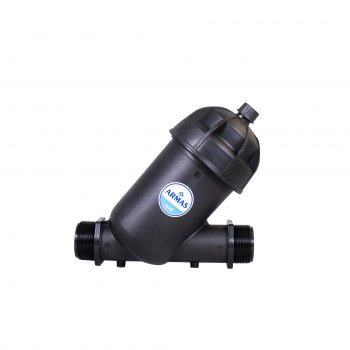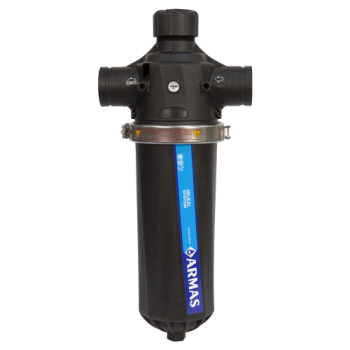Disc filters
Disc filters are filters that use the principle of non-passage of particles that have a size greater than the filter's degree of filtration.
Armas disc filters are a type of water filtration system that uses a series of plastic discs to remove impurities from the water. The degree of filtration is determined by the size of the hole formed between the discs when they are compressed. The discs are compressed by water pressure. The discs are flushed when the water pressure is released by reversing the flow of water. These filters are commonly used in agriculture and industry where large volumes of water must be treated quickly and efficiently.
Discs in Armas disc filters are made of high quality polymer material, durable and resistant to wear and tear. Each disc contains a series of small holes through which water passes, while blocking larger contaminant particles. The discs are stacked, with water flowing through the stack from the outside to the inside. As the water passes through the discs, the impurities remain on the discs and are filtered out, while clean water flows out of the center and out of the filter. The main advantages of Armas disc filters are their efficiency and affordability. Because the discs are stacked, they provide a large surface area for filtration, resulting in high flow rates and effective removal of impurities. In addition, the filters are easy to maintain and can be easily cleaned by flushing them with water or backwashing. Armas disc filters cover a wide range of applications, from the domestic segment to the industrial sector. They are an effective and efficient way to remove impurities from water, ensuring that it is safe for use.
There are several types of disc filters, each designed for specific tasks in filtration. The main ones are:
- Mesh disc filters: these filters use a series of plastic or metal screens to filter impurities from the water. They are ideal for removing larger particles such as sand, rust and dirt.
- Metal disc filters: these filters use a series of metal discs with grooves or channels that trap and remove impurities from the water.
- They are ideal for filtering smaller particles such as algae and bacteria.
- Plastic disc filters: these filters use a series of plastic discs with small holes to filter impurities out of the water. They are lightweight and easy to install, making them ideal for agricultural and irrigation applications.
- Automatic Disc Filters: these filters have a self-cleaning mechanism that uses a pressure differential to automatically clean the filter media. They are ideal for applications where continuous filtration is critical.
- Manually operated disc filters. These filters require manual cleaning or changing of filter media. They are ideal for smaller applications where a self-cleaning mechanism is not necessary.

Untreated tap water contains mechanical impurities, metals, bacteria, pesticides, chemicals in varying amounts that accumulate in the body and can cause various diseases.

Water treatment helps get rid of the unpleasant taste and odor that appear as a result of an increase in the concentration of inorganic and organic substances in the composition of such water.

Lithuanian water leads to the accumulation of scale on the heating surfaces of electrical appliances, consequently reducing their thermal conductivity. This accelerates appliance failure and increases energy costs.

It is known that the consumption of clean water is extremely important for maintaining health. That is why purified water is necessary for a person to protect himself from many diseases and to continue an active life without doctors and pills.
own enterprise
customized solutions
operational experience
and installation








